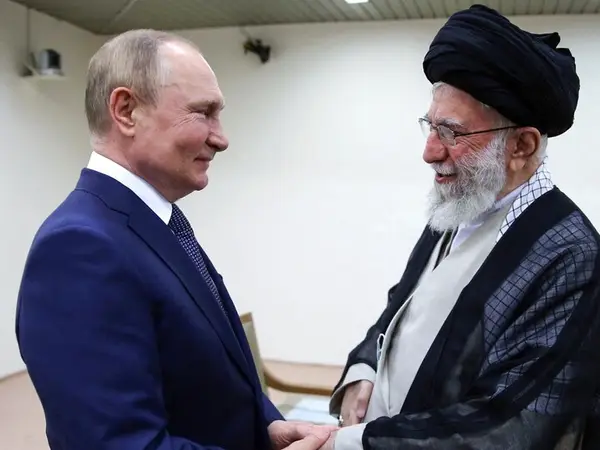Iranian media and politicians continued to criticize the government for its close ties with Russia, while it supports UAE claims on three islands in the Persian Gulf.
Moscow has repeatedly sided with the United Arab Emirates during summits with Arab states regarding claims on Abu Mousa and Greater and Lesser Tunb islands, that have been Iran’s sovereignty since 1971.
The conservative Jomhouri Eslami [Islamic Republic] newspaper, which is always critical of President Ebrahim Raisi's policies, in its Wednesday's issue asked the government why has it “turned the Kremlin into its Mecca.”
The daily asked the government: "If you are not going to expel Russia's ambassador and downgrade your relations with Moscow, at least explain why you turn to the Kremlin rather than to Mecca."
The newspaper was referring to the Muslim practice of facing Mecca when they want to talk to God in their daily prayers.
The daily went on the say, “The fact that the Foreign Ministry had to remind the Russian government twice that it has undermined Iran's territorial integrity showed that Tehran is not going to opt for a serious confrontation with Moscow." The conservative newspaper added that "summoning Russia's charge' d' affairs by the Foreign Ministry was less than serious." The daily added: "When they do it twice, they want to tell you that it was not a mistake." The newspaper then called for a treatment that would make Russia regret its stance.
Supreme Leader Ali Khamenei and President Ebrahim Raisi who have been seriously humiliated by Russia's stance, are also under attack from Iranian social media users. One user wrote that in case the issue of ownership of the three islands is raised at the UN Security Council, Russia and China have already revealed their stance in favor of the United Arab Emirates. Ironically, in such a situation, only a veto by the United States, which Iran perceives as its arch enemy, can save Tehran from serious trouble and damning humiliation.
Meanwhile, former Foreign Minister Ali Akbar Salehi said in an interview with Entekhab news website in Tehran that it would be catastrophic for Iran to tie its destiny entirely to its ties with Russia, China and even the United States. "Iran should stand in the middle of those three countries and benefit from opportunities and their weaknesses."
In another development, in an attempt to make sense of Russia's position, Iranian foreign policy analyst Mehdi Motaharnia said that "By getting closer to the United Arab Emirates, Russia is telling the West that Iran is no longer its strategic ally. Nonetheless, Moscow uses the Iran card whenever it needs to."
Motaharnia said that by siding with the UAE and Arabs, Russia tries to create an international atmosphere in favor of its own national interests. In its interactions with the United States, Russia claims to be a close ally of Iran, he argued. However, in the endgames, Russia usually uses this apparent proximity with Iran as a winning chip and a tactic to weaken US positions and promote its own national interests. Motaharnia went on to warn Iranian officials that even if Russia was genuinely an ally of Tehran, the world of politics is not a place for ideological attitudes.
Iran’s Supreme Leader Ali Khamenei has displayed a dislike of the United States and the West throughout his 34-year rule, showing affinity with Russia and China, while often receiving less than the desired results.
Earlier in the week, possibly to reduce the angry mood in Iran, Foreign Minister Hossein Amir-Abdollahian claimed that his Russian counterpart Sergey Lavrov emphasized Russia's respect for Iran's territorial integrity in a telephone call. On Wednesday, the press in Tehran revealed that Lavrov had not said that.
